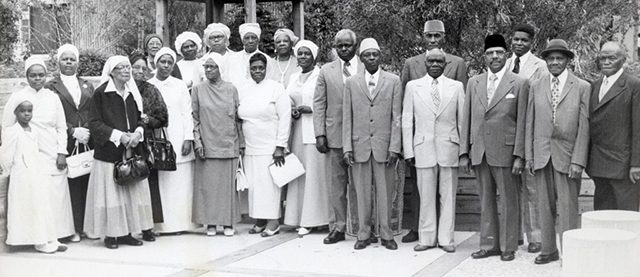
Oral History Interview with Tariq Touré on February 27, 2021
Files
Loading...
Interviewee
Touré, Tariq
Interviewer(s)
Sadid, Abdul-Zahir; Perkins, Dr. Alisa (Research Director)
Description
Oral history interview with Tariq Touré, conducted by Abdul-Zahir Sadid on February 27, 2021. Interview written by Dr. Alisa Perkins (Research Director) and Abdul-Zahir Sadid. Tariq Touré was born on January 20, 1988 in West Baltimore, Maryland, into a family that was active in local Muslim community-building. In the early 1970s, Tariq’s father was one of the founders of Masjid As-Saffat in Maryland, which is known as one of the oldest Sunni mosques in the state. Growing up, Touré attended an Islamic parochial school affiliated with his family’s mosque and also attended public schools. Early on, Touré discovered his talent for sports and earned a football scholarship. He obtained his undergraduate degree at Bowie State University and a Master’s degree from Howard University, specializing in housing policy, social welfare policy, and community administration. After graduating, Touré served as a caseworker at a men’s transitional shelter where he helped unhoused people and people returning from prisons. He then became a community engagement director at a mental health facility where he worked one-on-one with young children. Touré works with Islamic Relief USA, where he takes part in a range of charitable initiatives. In addition to his social service career, Touré is a prominent poet who has published several highly regarded volumes, including Black Seeds and Two Parts Oxygen. He is also the author of the acclaimed children’s book, David’s Dollar, which illustrates the importance of keeping wealth circulating within local African- American communities. In the interview, Touré reflects on the significant ways that his community helped support and encourage him through the process of writing and releasing David’s Dollar. Within the last few years, Touré moved to Detroit, where he became actively involved in the neighborhood revitalization organization Dream of Detroit. In the interview, Touré discusses his childhood, his career, and his growth as an artist. He also reflects on how his academic study of social welfare policy and his life experiences have expanded his understanding of the positive impact that a welcoming community and supportive neighborhood can have in the lives of individuals.
Date of Interview
2-27-2021
Location of Interview
Detroit, MI (Muslim Center Mosque and Community Center)
Keywords
African-American history, African-American Muslims, Alexandria, Zakia Amin, Artistic memory, Baltimore Hill neighborhood, Basketball, Black Renaissance, ‘Black Seeds', Black-owned business, Bowie State University, Capitol Heights, Caseworker, Shaykh Momodou Ceesay, Charity, Children's book art, Children's literature, Community administration policy, Community building, Community economics, Community engagement, COVID-19 pandemic, Crack epidemic, Damascus, Dar Al-Noor, Dar Al-Rahma, Dar-ul-Islam Movement, Mahmood Darwish, ‘David's Dollar', Detroit, Dhikr beads, Dream of Detroit, Edmondson-Westside High School, Extracurricular activities, Football, Football scholarship, Dr. Makeba Green, Griots, Hadhramaut, Historically Black Colleges and Universities (HBCUs), Homelessness advocacy, Housing policy, Howard University, Islam, Islam in America, Islamic Center of Detroit (ICD), Islamic Community School (Baltimore), Islamic dress, Islamic Organization of North America (IONA), Masjid, Islamic parochial school, Islamic Relief USA (IRUSA), Islamic studies, Imam Salim Joseph, K.E.Y.S Development Mental Health, Keffiyeh, Lebanese Americans, Louisiana, Martin O'Malley's administration, Maryland, Masjid As-Saffat (Baltimore), Masjid ul-Haqq (Baltimore), Men's transitional housing, Michigan, Imam Warith Deen Mohammed, Monroe, Muslim Americans, Muslim Center Mosque and Community Center, Muslims, National Football League (NFL), Neighborhood relations, Neighborhood revitalization, North Carolina, Palestinian-Americans, Poetry, Prince George's County, Prophets of Islam, Raleigh, Rights of neighbors, Anika Sabree, Sadaqa, School uniforms, Social welfare policy, Storefront madrasa, Storytellers, Sunni, Syria, ‘Two Parts Oxygen', Virginia, War on Drugs, Washington D.C., Booker T. Washington, Wealth gap, West African-Americans, West Baltimore, Worship center, Yemen, Zawiyah
Disciplines
Africana Studies | American Studies | Children's and Young Adult Literature | Civic and Community Engagement | Digital Humanities | Inequality and Stratification | Islamic Studies | Nonprofit Administration and Management | Poetry | Politics and Social Change | Race and Ethnicity | Race, Ethnicity and Post-Colonial Studies | Religion | Urban Studies and Planning
Language
ENG
Document Type
Interview
Rights Statement
Dream of Detroit Interviews were made possible by funding from the Pillars Grant and Whiting Foundation. Content is for educational purposes only and non-reproducible; interviews are not to be duplicated, but may be linked through ScholarWorks with appropriate attribution. Please direct any questions about copyright to scholarworks@wmich.edu.
Funder
Pillars Fund and Whiting Foundation
Grant
Dream of Detroit
Length of Video
1:00:45
Recommended Citation
Dream Storytelling Project Team, "Oral History Interview with Tariq Touré on February 27, 2021" (2021). Dream Storytelling Interviews. 26.
https://scholarworks.wmich.edu/dream-storytelling-interviews/26



Notes
Interview conducted by Abdul-Zahir Sadid at the Muslim Center Mosque and Community Center. Interview written by Dr. Alisa Perkins (Research Director) and Abdul-Zahir Sadid. Interview recorded under the direction of Supervising Producer Malikah Shabazz. Videography by Zayd Walid, facilitated by Naimah Siddiq. Video Edited by: Mandy Weiss. Transcribed by: Sara Faraj. Transcription edited by: Dr. Alisa Perkins. Metadata prepared by: Melissa Paduk. Metadata edited by: Dr. Alisa Perkins and Sophia Wimberley.